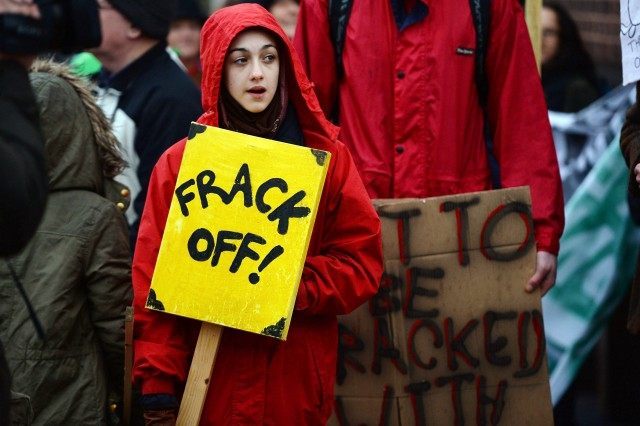The decision by Lancashire County Council to reject a planning application for shale gas drilling was taken against the advice of both their planning and legal departments as well as being contrary to a recommendation by the Department for Energy and Climate Change.
The planning application lodged by fracking firm Cuadrilla was voted down by 9-3 with two abstentions. The decision was immediately greeted with cheers from an anti-fracking crowd which had gathered outside, and their cheerleaders in the media, including the BBC.
But the planning documents put to the council show that both the council’s planning department and their legal department thought the bid should go ahead. The summary recommendation handed to councillors reads: “that after first taking into consideration the environmental information and further information, […] planning permission be granted subject to conditions [which it lists]”.
Meanwhile, the legal advice was rather more to the point. David Manley QC from King’s Chambers, Manchester wrote to the council “as a matter of utmost urgency to reduce into writing advice given over the telephone.
“It is my understanding that earlier today a Councillor proposed refusal of the scheme,” on the grounds that the proposal contravened policies which state that drilling or fracking can only take place “potential impacts can be kept to acceptable levels.”
He continued: “I am unclear as to exactly which impacts the Councillor envisaged as being unacceptable although it was indicated that landscape/visual and amenity impacts appeared to be the concerns.
“In the instant case the reality is that [the council’s] own Specialist Advisory Service has not objected to the proposal and categorises landscape impacts as moderate.
“The Service notes the effects as temporary and reversible and acceptable in landscape terms. The reporting Officer also concludes an absence of unacceptable landscape/visual impacts. I have not seen any evidence that could credibly justify a contrary conclusion – on any view, impacts are highly localised, temporary and reversible.”
Yet despite this clear advice to the contrary, the councillors decided to rule against the application on the grounds that the fracking operation would cause too much noise and have an adverse impact on the landscape.
Cuadrilla’s CEO Francis Egan has indicated that the firm was likely to appeal the decision, and legal experts have advised that it is likely to win it’s appeal thanks to the reasons given above. “It’s beyond me why they would vote against it,” he said.
As the reasons given by the councillors for rejecting the application fly in the face of clear legal advice, it is possible that they were merely using the environmental impact as cover for ideological objections.
The meeting documents list a number of submissions by anti-fracking and environmentalist groups urging the councillors to reject the application without good scientific reason. For example, evidence submitted to the committee shows that the carbon emissions likely to come about through the fracking operation are acceptable, the upper range estimate being equivalent to about 0.02 percent of the UK’s annual emmissions.
Yet Friends of the Earth dismissed this, merely stating “The assessment of the potential for greenhouse gas (GHG) emissions is incorrect.”
Local anti-fracking groups were even more vague and ideological in their objection, with statements such as: “The development will contribute to climate change, and is therefore contrary to the NPPF [National Planning Policy Framework] and the Climate Change Act (2008),” and “No need to rely on gas if commitment to climate change and a greener energy supply.”
However, the report also notes that in 2013, the House of Commons Energy and Climate Change Committee looked at shale gas and concluded “the US shale gas revolution has seen significant reduction in the country’s greenhouse gas emissions because of a large switch from coal to gas.”
And it noted, “a report by DECC’s Chief Scientific Advisor in 2013 concludes that shale gas’s overall carbon footprint was comparable to gas extracted from conventional sources, lower than that of liquid natural gas and, when used for generating electricity, significantly lower than that of coal if the correct controls are used,” although it adds that that report was also contested by Friends of the Earth.
Dr Benny Peiser, director of the Global Warming Policy Foundation said: “It is very disappointing to hear that Lancashire County Council have rejected this application, despite its own planning officers recommending that permission should be given.
“Shale exploration is clearly in the national interest and nimbyism should not stand in the way of Britain’s energy security.”
He has called on the government to do more to ensure that fracking operations aren’t caught up in ideological battles at local level, adding: “David Cameron has claimed that he wants to see Britain ‘go all out for shale’. In light of this decision by Lancashire County Council, the Government needs to urgently review its shale gas strategy to ensure that speedy exploration can take place. It should strongly consider the option of treating shale gas fields as Nationally Significant Infrastructure Projects.”
A spokesman for David Cameron stated: “We respect the planning process. The Government has been clear that we think shale has got huge potential and presents us with an opportunity to develop a new energy resource and create jobs.
“We will continue to look at how we can develop this industry in the UK.”
UKIP’s energy spokesman Roger Helmer MEP told Breitbart London: “Lancashire County Council has taken a stand against prosperity and jobs, and against energy security.
“By retreating in the face of strident and mendacious propaganda and scare-mongering from ‘green’ groups, they have done a great disservice to their county and their country.
“Shale gas is overwhelmingly cleaner and safer than coal. Anyone who regrets the loss of the coal industry should be particularly disappointed by this damaging decision.”
Follow Donna Rachel Edmunds on Twitter: Follow @Donna_R_E or e-mail to: dedmunds@breitbart.com

COMMENTS
Please let us know if you're having issues with commenting.